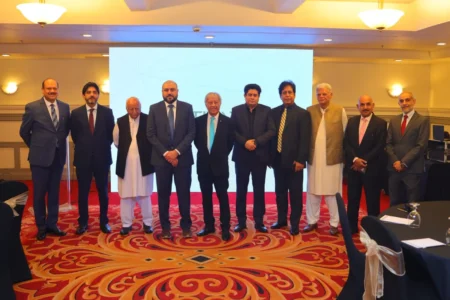LONDON: Government spending watchdog asked to review costs and benefits of then Chancellor Rishi Sunak’s 2020 ‘own goal’ decision
The Treasury’s independent forecaster is to review the axeing of tax-free shopping for tourists, raising the possibility that a decision that leisure companies and retailers have blasted for deterring visitors and losing the UK billions in sales could be reversed.
With a change of heart likely to be seen as a shot in the arm for struggling businesses, the Office for Budget Responsibility (OBR) is to examine the costs and benefits associated with Rishi Sunak’s 2020 decision to end the retail scheme when he was Chancellor of the Exchequer.
Richard Hughes, chair of the OBR, said the government spending watchdog plans to publish its conclusions alongside the budget next month.
In a letter to Conservative backbench MP Sir Geoffrey Robert Clifton-Brown in December, he said: “We will undertake this analysis in the first months of 2024 with an aim of publishing its conclusions alongside the spring budget.”
The review, first reported in the Sunday Times, comes “in the light of subsequent evidence on international visitor numbers and their consumption patterns and the analysis carried out by a number of outside bodies”, the letter added.
The Treasury has estimated that restoring VAT-free shopping will cost the exchequer £2bn, but Hughes has said “this was not analysis undertaken by the OBR”.
Last year, as part of an industry campaign to scrap the tax, the economics consultancy the Centre for Economics and Business Research said the removal of tax-free shopping was costing the UK economy £10.7bn a year and deterring 2 million tourists annually.
It added: “Despite our analysis showing clear economic benefits associated with a VAT refund scheme and demonstrating the analytical errors in the government’s calculations, the decision to terminate the scheme was upheld.”
The “tourist tax” has even been blamed for contributing to the recent slump in the share price of Watches of Switzerland last month – as the UK’s biggest seller of Rolex and Omega timepieces became the latest luxury retailer to experience reduced spending by aspirational shoppers.
Not including the super-rich, US or Asian shoppers looking for a handbag or a luxury watch are more likely to allocate more of their budget to boutiques in Paris or Milan rather than London as a result, retailers claim.
Last year, Gerry Murphy, chair of fashion group Burberry, criticised Sunak while the prime minister was attending a business event, saying that the then chancellor’s decision to remove tax-free shopping for tourists was “somewhat perverse” and a “spectacular own goal”.
Attempts to persuade the government to revisit the decision were renewed this weekend with the launch of a new campaign by Heathrow airport, the British Chambers of Commerce and the Federation of Small Businesses




